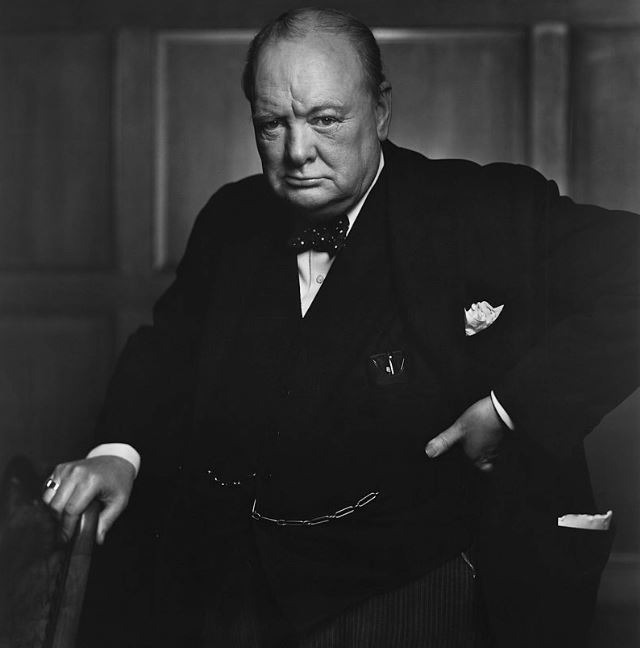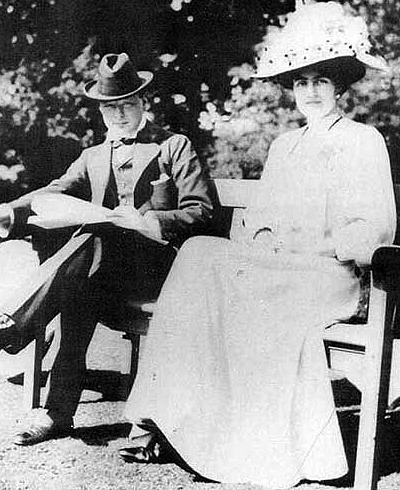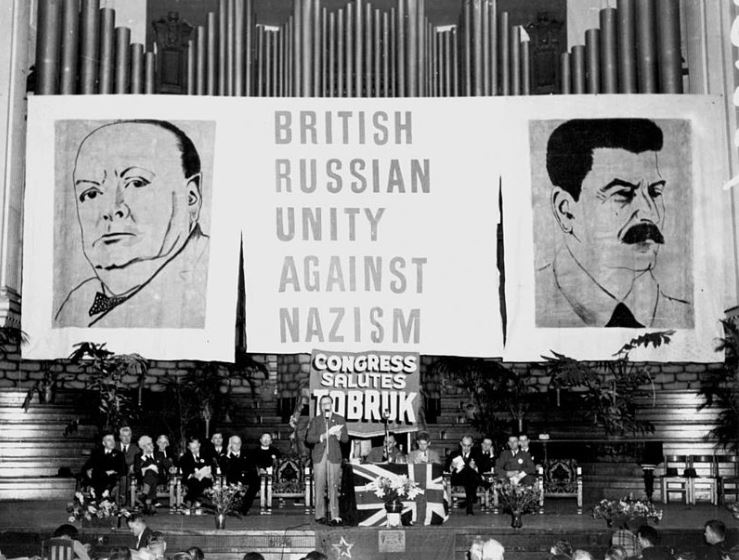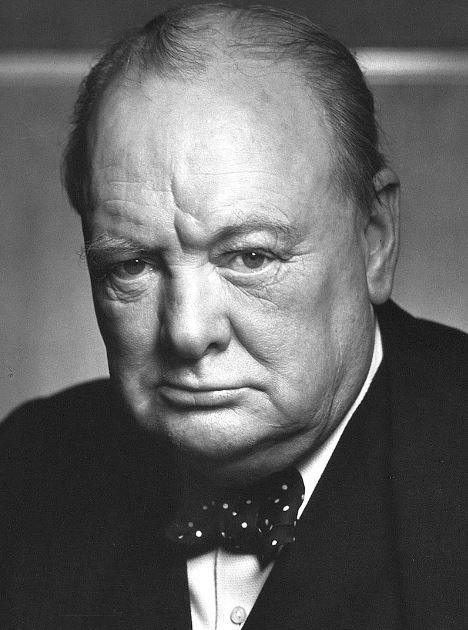Winston Churchill was a British statesman and military leader who twice served as his country’s prime minister. He is best remembered for leading Great Britain during World War II and helping to defeat Nazi Germany.
Who was Winston Churchill?
Winston Churchill was the Prime Minister of the United Kingdom from 1940 to 1945 and again from 1951 to 1955 during World War II. Before the war, he was a leader in opposing Neville Chamberlain’s appeasement policy toward Nazi Germany. When it appeared the war would most likely end badly for Britain, newspapers pressed for negotiation with Hitler. Churchill rejected this approach, countering that Britain should instead greatly increase its armored forces to prepare for a possible German invasion attempt.
Early Life and Education
Sir Winston Leonard Spencer-Churchill was born at Blenheim Palace on November 30, 1874. In the early 19th century, his father—Lord Randolph Churchill—was a politician and socialite who had risen high in British society due to his marriage to Jennie Jerome, an American-British socialite. Winston was their only child together; his mother died while he was still young.
Although Winston’s father wanted him to follow in his footsteps, Winston showed little interest in politics as a youth; instead, he preferred sports and nature walks with friends (the latter of which inspired many of his later writings).
At age 13, he enrolled at Harrow School, where he developed an interest in history and English literature through study with Professor Walter Raleigh Lees-Smith.
When Winston Churchill was 16 years old, he began attending several different schools, including Harrow School, where he studied military history and tactics as well as the French language. He then attended Sandhurst Military Academy, where he received officer training in 1895.
Although Winston Churchill failed the entrance exam for Sandhurst three times before finally passing, he excelled once he was enrolled. He finished 20th in his class of 130 upon graduation from the Royal Military College at Sandhurst.
Churchill’s relationships with his parents were distant but loving in his youth. He wrote emotional letters to his mother, begging her to visit him at school—but she seldom made the trip.
Churchill’s father died when he was 21, and there is some evidence of a troubled relationship between them.
After graduation from Sandhurst Military Academy, Winston Churchill served in India for three years. He participated in several skirmishes against local tribesmen and became acquainted with many prominent figures such as Mohandas Gandhi, who would later be an integral part of the Indian independence movement.
Wife and Children
Winston Churchill’s first wife, Clementine Ogilvy Hozier, supported him greatly throughout his life. They married in 1908 and had five children together: Diana, Randolph, Sarah, Marigold, and Mary. Clementine was a strong influence on Winston – she encouraged him to pursue his career as an officer in the British Army during World War I and kept him focused on their family while he worked hard at Parliament.
Lady Clementine Spencer-Churchill died in 1977 after suffering a heart attack at her apartment in London. She was 92. Lady Churchill had a celebrated marriage to a leader many viewed as one of the greatest of his time.
Churchill’s Military Career
As a young man, Churchill served in the army. He was commissioned as an officer in the 4th Queen’s Own Hussars in 1895 and joined the British Army in India. In 1897, he took part in an expedition to Sudan, where he saw action at the Battle of Omdurman. After this campaign, Churchill returned to England and married Clementine Hozier on September 12, 1908.
In January 1899, Churchill went to South Africa, where he served on active duty during the Second Boer War (1899-1902). While fighting against Dutch settlers known as Boers, who had declared their own republics within South Africa’s borders (the Orange Free State and Transvaal) and were seeking independence from Britain, Churchill was captured by a Boer raiding party but escaped after two days’ imprisonment because his captors believed him too young for execution if caught again.
Later that year, while leading a scouting mission with another group of soldiers near Pretoria—now Tshwane—he was wounded when a bullet grazed his left shoulder at close range from behind; however, this injury didn’t prevent him from participating in further combat operations before returning home later in 1900 following an armistice between British forces led by Lord Roberts and those led by Louis Botha (one of four presidents elected by Transvaal citizens).
Churchill’s Political Career
Churchill began his political career in 1900 when he became a Member of Parliament. He quickly became one of the Conservative Party’s most prominent figures and eventually became a cabinet minister. In 1911, Winston even served as Chancellor of the Exchequer (the equivalent of today’s Secretary of the Treasury).
As Board of Trade’s president, Churchill clashed with newly appointed Chancellor David Lloyd George over plans for an expanded British navy. He introduced several reforms to the prison system and helped set up labor exchanges and unemployment insurance.
Churchill’s involvement in social reform included assisting in passing the People’s Budget. The Budget introduced taxes on the wealthy to pay for new social welfare programs, but it was initially rejected by peers in the House of Lords before being passed in 1910.
In January 1911, Churchill displayed courage and decisiveness when he went to a police siege in London, where two alleged robbers were holed up in a building.
World War I
Churchill was forced to resign from the position of First Lord of the Admiralty in 1915 after his part in the failed Gallipoli campaign. He remained in government service but held no other major positions during World War I.
In 1916, Churchill returned to military service and led a battalion of the Royal Scots Fusiliers on the Western Front. In 1917, he was appointed Minister of Munitions; his new position involved the production of tanks, airplanes, and munitions.
World War II
In the 1930s, Churchill warned Britons about the dangers of Nazi nationalism. However, his countrymen were weary of war and reluctant to participate in international affairs again.
In 1938, Prime Minister Neville Chamberlain signed an agreement giving Germany a chunk of Czechoslovakia in exchange for a promise of peace, but Winston Churchill scolded him, calling the move “throwing a small state to the wolves.”
A year after promising not to attack Poland, Hitler broke his word and invaded. Britain and France declared war on Germany, and Neville Chamberlain resigned as prime minister. Winston Churchill took office in May 1940.
His leadership during World War II was a crucial factor in the Allied victory over Nazi Germany and Japan. He was also instrumental in establishing a framework of international relations that would last long after the conflict ended: his close relationship with President Franklin D. Roosevelt led to the creation of the United Nations; his strong friendship with Soviet leader Joseph Stalin led to an alliance between Britain and Russia against Nazi Germany, and his determination to maintain Britain’s independence influenced British policy for many years after 1945.
Winston as an Artist
Churchill began painting landscapes at age forty. The compositional challenge of depicting a landscape gave him temporary repose from his heroic rebellion against authority. Over a period of forty-eight years, he created more than 500 works of art. His art was a blend of passion and philosophy.
What he enjoyed most was discussing the aesthetic rewards of amateur painting and publishing his views on the subject in magazines. To him, it was a way to escape everyday life’s crowding events and pulsating politics.
His initiation into painting was simple: he took a child’s paint box and the next morning produced a full outfit of oils.
Winston as a Writer
Winston Churchill was a prolific writer who wrote 43 books during his lifetime. Winston Churchill supported himself and his family throughout his life by writing books and articles. Winston Churchill’s first book, The Story of the Malakand Field Force, was published in 1898. About his writing process, he said, “It was great fun writing a book. One lived with it. It became a companion.”
He fought in World War I and World War II, as well as other conflicts that took place during his lifetime. He also wrote several famous books about history and war, including A History of the English-Speaking Peoples, The Second World War, My Early Life, The River War, and The World Crisis.
Winston Churchill was awarded the Nobel Prize for Literature in 1953.
Winston as Prime Minister – First Term of Office
When Churchill became Prime Minister, he immediately set about repairing the damage done by Chamberlain. He signaled this change of course with his first speech in office: “I have nothing to offer but blood, toil, tears, and sweat.” The British people were united behind him in their resolve to fight the Germans until victory was achieved.
Five months later, the Battle of Britain began; it would be eight months before Germany could launch another major offensive against Britain.
Death
The British statesman Sir Winston Churchill died on January 24, 1965, at the age of 90. He suffered a severe stroke nine days earlier and was taken to his London home, where he passed away. His death prompted an outpouring of grief in Britain for more than a week.
Medical experts pointed to Churchill’s earlier strokes, rather than Alzheimer’s disease, as the cause of his mental decline in his final years.
Conclusion
Winston Churchill was a man of many talents. He was a writer, painter, and politician who rose to the highest office in his country. He is widely regarded as one of the greatest leaders of all time and deserves to be remembered!
References
https://www.biography.com/political-figure/winston-churchill
https://www.nationalchurchillmuseum.org/winston-churchill-the-writer.html
https://www.history.com/topics/british-history/winston-churchill
https://archives.chu.cam.ac.uk/collections/churchill-papers/churchill-biography/





